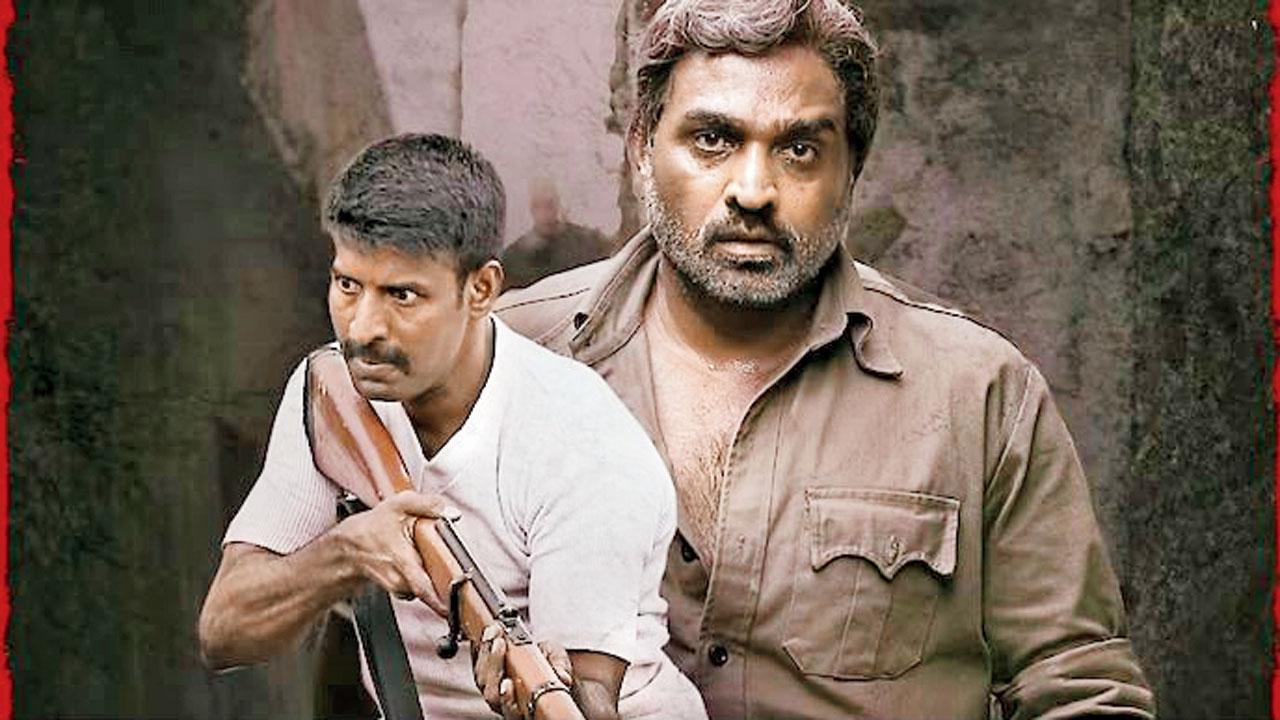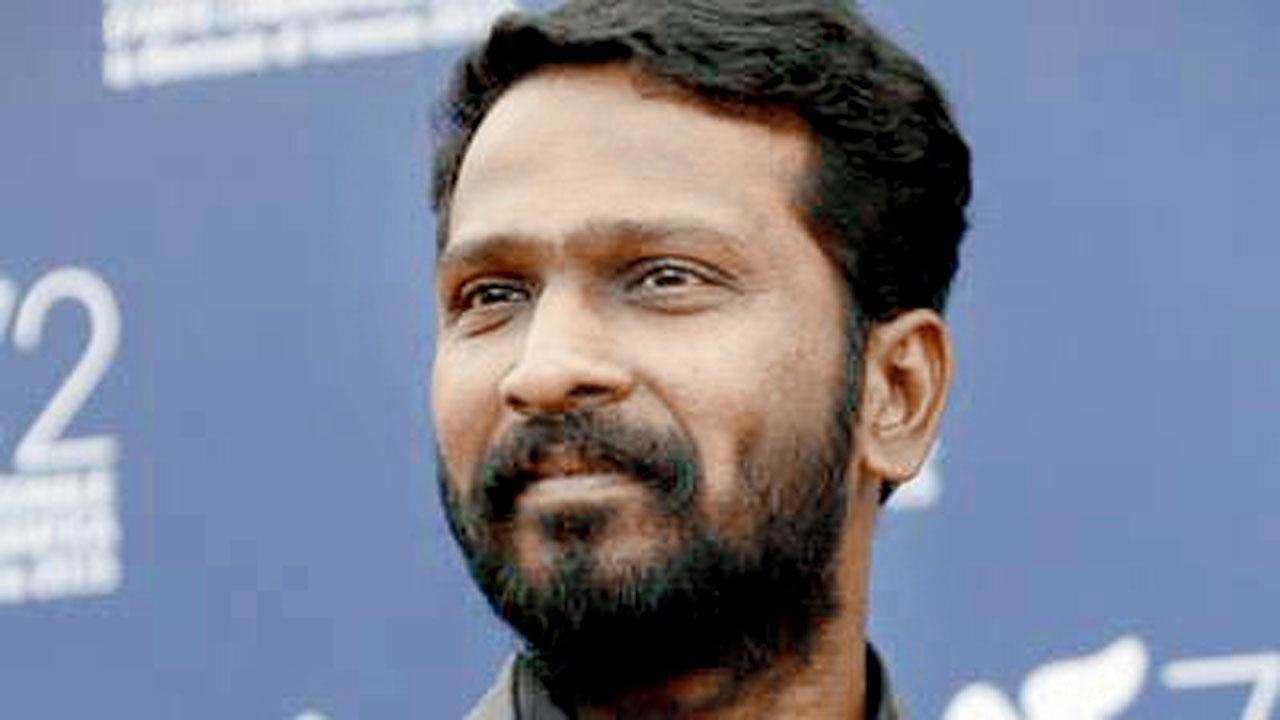Is there currently a better exponent of empathetic plus tough-male movie genre, than the champion from Chennai?

Actors Soori and Vijay Sethupathi in the film Viduthalai Part 1
 Deaths must count in movies. Else, those living in them won’t matter. I guess it’s just a Shakespearean device to simply kill characters off one by one, overused in thrillers for a climax—that’s been my perennial pet-peeve as an audience.
Deaths must count in movies. Else, those living in them won’t matter. I guess it’s just a Shakespearean device to simply kill characters off one by one, overused in thrillers for a climax—that’s been my perennial pet-peeve as an audience.
ADVERTISEMENT
I thought of this, with much relief/satisfaction, in an early, lingering, action sequence, in Viduthalai: Part I (recently dropped on Zee5)—of a random cop hit by a bullet in a stray ambush.
His colleagues kinda surround him in the moment of truth—reminding him of a life that awaits him, once he survives. The injured cop is yelping uncontrollably like a pup in pain. It feels the most real. Camera stays on him for more than a few seconds. Death is meant to count.
Viduthalai is directed by Vetrimaaran—currently the indisputable champion of empathetic and super-realistic tough-men movies’ genre, from Chennai. He’s self-admittedly Shakespearean—in the way he patiently mines drama and multiple characters.
Also Read: OK, let’s do some TP in Delhi’s CP!
Like Shah Rukh for Shahrukh Khan, or Ram Gopal for Ramgopal Varma, I notice, Vetrimaaran has numerologically benefitted much from splitting his name, as Vetri Maaran, in his later movies’ credits. He shot to national fame among non-Tamil audiences with Visaaranai (2015) getting picked as India’s official entry to the Oscars in 2016.

Director of the film Vetri Maaran. Pics/Twitter
As director, Visaaranai was Vetri Maaran’s first film without his filmmaking partner plus muse, Dhanush, as lead actor. As with Viduthalai, with the staggeringly subdued Soori, instead, playing the protagonist—a lowly soldier in a special police force.
Dhanush (Asuran, Vada Chennai), of course, being to Vetri Maaran, what Amitabh Bachchan was to Salim-Javed—his own ‘Angry Young Man’. Under Vetri Maaran, Dhanush is inevitably the believable guy of the street that audiences can instantly repose their faith, and passively reflect on themselves through.
It’s this proper, young, vulnerable, working-class hero that Hindi-speaking masses have missed in their mainstream films, all the way since the ’90s. Which isn’t the same as suave, versatile leads playing working-class parts, here and there. The identification isn’t complete.
It’s perhaps for the lack of the star Dhanush himself—what unites Visaaranai and Viduthalai is the absence of a more obvious movie-heroism. The former was shot in the style of cinema verité, largely shorn of set-pieces/splendour.
The latter is way more visually crafted—opening with the ambitiously long sequence of a massive train sabotage/wreck, by a militant outfit (headed by Vijay Sethupathi), that’s been attacking the state, in response to the usurping of their forest lands, and other demonic excesses.
What’s common to Visaaranai and Viduthalai further is how deep it dives into a police barrack/camp/station, exploring several shades of grey. As if literally reporting like an insider on the police-punishment system. Which, along with the network of politicians, is seemingly not very different from a life of crime.
Now, I’m usually a bit iffy on the auteur theory—meaning all credit/style/voice of a film must be solely credited to a director, whose filmography, in turn, reflects something consistent, and overarching, as a whole.
And yet, while settings and characters unrecognisably change, there are few directors, like Vetri Maaran, who’s been securely telling the same story—of a man from the under-classes, unsuspectingly drawn into a chaos he never asked for. He’s ultimately compelled to toughen up and lead himself out of the strange cosmos, or remain caught within it forever.
Caste differences/atrocities is somewhat central to the theme as well. Spears, swords, machete are the preferred weapons of choice. Which also tells you so much about movies, isn’t it? It’s about the telling—not so much the story!
As a mentee of the more classical Balu Mahendra (1939-2014), you also sense Vetri Maaran, 47, veering closer still to a snappier, slicker craft/treatment, gloriously wading through gunk—along the lines of, say, Lijo Jose Pellissery (in Malayalam), or Nagraj Manjule (in Marathi).
Saying this only because I can’t think of a better hat-tip to Manjule’s Sairat than Vetri Maaran’s disturbingly brilliant short, Oor Iravu, in the Netflix anthology, Paava Kadhaigal (2020).
Unfamiliar with one of the world’s oldest languages, I don’t know what those film titles mean, so find them hard to recall. Which is my other pet peeve over alternate English titles not being given equal prominence for films once deemed regional/foreign—while that concept in a flat (online) world barely exists anymore.
Also, a reason I’ve to always Google (quite possibly) my favourite Malayalam film to recco, Thondimuthalum Driksakshiyum (2017). No such issue with the Oscar-toast Parasite, for whatever it’s called in Korean. Same with the other Telugu Oscar-winner, RRR.
Vetri Maaran’s The Interrogation (Visaaranai) should’ve made the Best International Film Oscar-nom. The director, along with producer Guneet Monga, Alif Surti (from Fox) camped for long in LA.
Maybe the Telugu/Tamil language confusion between characters, so essential to The Interrogation plot, set around Andhra/Tamil Nadu border, was lost on the jury. As a Hindi speaker, I can rattle off Vetri Maaran’s directorial debut though: Raja Taqatwar (2007)—that’s how I watched Polladhavan in Hindi-dub!
The quantum leap from ‘Masala Taqatwar’ to the studied, solid, splendidly political, Viduthalai: Part I—with a sequel soon, it is set for a five-and-half-hours’ gloriously brooding epic—is the latest reason film-buffs must globally discover, dig Vetri Maaran’s works.
Mayank Shekhar attempts to make sense of mass culture. He tweets @mayankw14
Send your feedback to mailbag@mid-day.com
The views expressed in this column are the individual’s and don’t represent those of the paper.
 Subscribe today by clicking the link and stay updated with the latest news!" Click here!
Subscribe today by clicking the link and stay updated with the latest news!" Click here!







